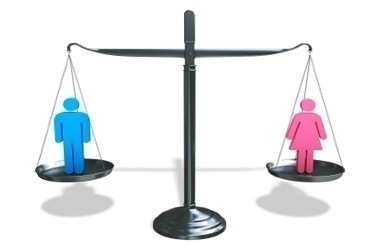Equal Rights of Men and Women and the Islamic Viewpoint
Page 1 of 1
 Equal Rights of Men and Women and the Islamic Viewpoint
Equal Rights of Men and Women and the Islamic Viewpoint

Islam considers men and women equal as far as the basic human rights are concerned. It not only recognizes a human personality for both, but also considers them equal in all rights and human privileges. The following verses of the Quran support this statement:
O, mankind, fear your Lord who created you from a single soul and from it created its mate, and from the pair of them scattered abroad many men and women .... (4:1)
And:
O mankind! We have created you male and female and appointed you races and tribes, that you may know one another. Surely the noblest among you in the sight of God is the most God fearing of you ....(49:13)
I waste not the labour of any that labours among you, be you male or female ‑the one of you is from the other ....(3:195)
And the believers the men and the women, are friends one of the other; they bid to honour and forbid dishonour; they perform the prayer, and pay the alms, and they obey God and His Messenger. Those upon them God will have mercy .... (9: 71)
Men and women who have surrendered (unto Allah), believing men and believing women, obedient men and obedient women, truthful men arid truthful women, enduring men and enduring women, humble men and humble women, men and women who give in charity, men who fast and women who fast, men and women who guard their private parts, men and women who remember God much, for them God has prepared forgiveness and a mighty re ward. (33:35)
O believers, let not any people scoff at another people who may 'be better than they; neither let women scoff at women who may be better than they. And find not fault with one another, neither revile one another by nicknames .... (49:11)
And We have charged man concerning his parents‑his mother bore him in weakness upon weakness, and his weaning was in two years‑be thankful to Me and to your parents ....(31:14)
They (women) are a vestment for you, and you (men) are a vestment for them ....(2:187)
To the men a share of what parents and kinsmen leave and to the women a share of what parents and kinsmen leave ....(4:7)
To the men a share from what they have earned, and to the women a share from what they have earned ....(4:32)
The fornicatress and the fornicator‑scourge each one of them a hundred stripes, and in the matter of God's religion, let not tenderness for them seize you if you believe in God and the Last Day ....(24:2)
Say to the believers, that they cast down their eyes and guard their private parts; that is purer for them ....And say to the believing women, that they cast down their eyes and guard their private parts ....(24:30‑31)
And the thief, male and female: cut off the hands of both as a recompense for what they have earned and a punishment exemplary from God ....(5:38)
These Verses were quoted as examples only, for there are many more verses clearly mentioning both the men and women and specifying the directions in their regard. Apart from this, there are hundreds of verses that take the form of address, "O mankind!" or "O believers!" which cover both men and women.
The above‑mentioned verses, in short, mean as follows: Both men and women are human beings, both are expected to follow Islam, be faithful and obedient believers. The good reward, paradise and God's grace are for both. Both have similar duties to perform; for instance, the ritual prayer, fasting, Zakat, to command to good and to prohibit from evil. The criterion of their personal superiority is based on piety and guarding themselves against evil. Moral virtues such as tolerance, sublimity, truthfulness, help to the poor ....are desirable for both. Both are required to observe chastity and keep their looks cast down. Moral vices, such as obscene acts, backbiting and mockery are not desirable for either of them. Both inherit property. The right to property and usage of property is granted to both men and women. The father and mother both deserve extreme respect. Both men and women are responsible for their deeds, which shall not go un-reckoned. Both are equal in the eyes of the Law and are to be punished for crimes committed. Finally, if a woman is at some loss in a particular case from the legal point of view, at another place the Law compensates for this loss and effects a legal balance in her favour.
Other verses in the Quran independently mention woman's rights, occasionally ordaining men to preserve those limits. At times the attitude of the pre‑Islamic culture in regard to women is criticized. For example, a verse condemns the practice of slaying girl‑infants in the words:
And when the buried infant shall be asked for what sin she was slain. (81:8‑9)
In addition to this, the Quran discusses well‑known women of religious history and describes their lives to the extent that falls within the scope of its objective. Such women are twelve in number. Even one of the Surahs of the Quran is named Surat al‑Nisa', which glorifies women.
 Similar topics
Similar topics» Laying foundation of the Islamic University in Madina
» Rights of Parents in Islam
» Imam Sajjad (AS)’s Quotes on Rights
» Rights of Parents in Islam
» Imam Sajjad (AS)’s Quotes on Rights
Page 1 of 1
Permissions in this forum:
You cannot reply to topics in this forum